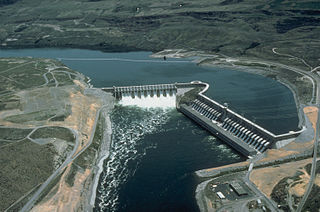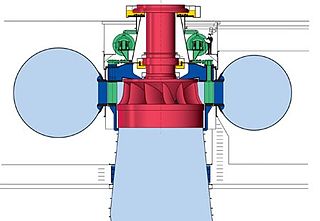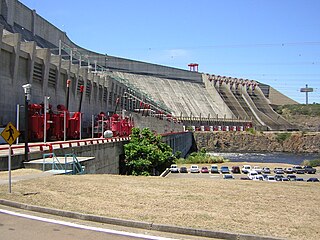
The Simón Bolívar Hydroelectric Plant, also Guri Dam, is a concrete gravity and embankment dam in Bolívar State, Venezuela on the Caroni River built from 1963 to 1969. It is 7,426 metres long and 162 m high. It impounds the large Guri Reservoir with a surface area of 4,250 square kilometres (1,641 sq mi).

Longtan Dam is a large roller-compacted concrete (RCC) gravity dam on the Hongshui River in Tian'e County of the Guangxi Zhuang Autonomous Region, China, a tributary of the Xi River and the Pearl River. The dam is 216.2 metres (709.3 ft) high and 849 m (2,785 ft) long; it is the tallest of its type in the world. The dam is intended for hydroelectric power production, flood control and navigation. The dam contains seven surface spillways, two bottom outlets and an underground power station. The Longtan ship lift, part of the dam complex, will be the tallest ship lift system in the world.
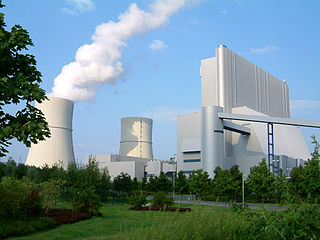
Schwarze Pumpe power station is a modern lignite-fired power station in the "Schwarze Pumpe" district in Spremberg, Germany consisting of 2 × 800 megawatts (MW) units. It came into service in 1997–1998 and was built by Siemens. The power station was sold by Vattenfall to the Czech energy group EPH and its financial partner PPF Investments on 30 September 2016.
The Pamilo Hydroelectric Power Plant is a power station in Eno, Finland that supplies electricity to Finland. It was opened in 1955.

The Goldisthal Pumped Storage Station is a pumped-storage power station in the Thüringer Mountains at the upper run of the river Schwarza in Goldisthal, Germany. It was constructed between 1997 and 2004. It has an installed capacity of 1,060 megawatts (1,420,000 hp), the largest hydroelectric power plant in Germany and one of largest in Europe.

Porjus power station is one of the oldest and largest power plants in Sweden, situated near Porjus. It was built 1910-1915 and has a power of 480 MW. Besides three-phase AC, the plant originally also generated single phase 15 Hz AC for railway traction and hence, two single-phase 80 kV power lines ran along the Iron Ore Line Malmbanan where it was transformed down to 16 kV in substations. However this system was later abandoned in favor of rotary converter stations. The original machines for single phase AC were subsequently scrapped.

The Lai Châu Dam is a hydroelectric dam on the Black River inaugurated on 20 December 2016 in Nậm Nhùn District, Lai Chau Province, Vietnam. The owner of the power station is Vietnam Electricity.

Masinga Hydroelectric Power Station, also Masinga Dam, is an embankment dam on the Tana River, the longest river in Kenya. It straddles the border of Embu and Machakos Counties in Eastern Province and is located about 106 km., by road, northeast of Nairobi, Kenya's capital and largest city.

The Tatar Dam is a earth-fill dam on the Peri River, near the village of Tatarköy in Kovancılar district of Elazığ Province, Turkey. Its primary purpose is hydroelectric power generation and is the sixth and last dam in the Peri River cascade, before Lake Keban. Construction on the dam began in 2008 and it began impounding its reservoir in early 2013. The power station was commissioned in late 2015. Its two generators were commissioned in February/March 2015. The 82 m (269 ft) tall dam withholds a reservoir of 299,570,000 m3 (242,870 acre⋅ft). It is owned and operated by Limak Energy and Bilgin Energy.

The Burç Bendi Dam is a gravity dam on the Göksu River, near the village of Burç in Adıyaman district, Adıyaman Province, Turkey. Its primary purpose is hydroelectric power generation and it supports a 27.9 MW run-of-the-river power station. Construction on the dam began in January 2008 and it was fully operational by 3 November 2010. The 57 m (187 ft) tall concrete dam withholds a reservoir of 26,600,000 m3 (21,600 acre⋅ft). Water is diverted through a 536 m (1,759 ft) long tunnel to the power station downstream which contains three 9.3 vertical Kaplan turbine-generators. It is owned and operated by ČEZ Group.
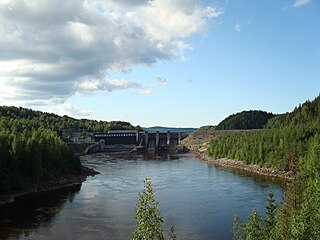
Moforsen Hydroelectric Power Station is a run-of-the-river hydroelectric power plant on the Ångerman, municipality Sollefteå, Sweden. About 15 km downstream of Moforsen is Forsmo Hydroelectric Power Station.
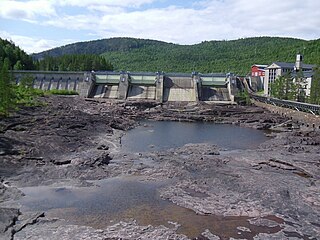
Krångede Hydroelectric Power Station is a run-of-the-river hydroelectric power plant on the Indalsälven in Jämtland County, Sweden. About 15 km downstream of Krångede is the urban area Hammarstrand.

Höljes Hydroelectric Power Station is a hydroelectric power plant on the Klarälven in Torsby Municipality, Värmland County, Sweden.
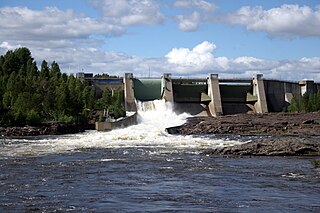
Stornorrfors Hydroelectric Power Station is a hydroelectric power station on the Ume River in Västerbotten County, Sweden. The city of Umeå lies about 15 km southeast of the power station.

Storfinnforsen Hydroelectric Power Station is a run-of-the-river hydroelectric power station on the Faxälven, in Västernorrland County, Sweden.

